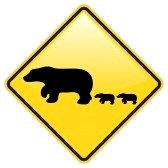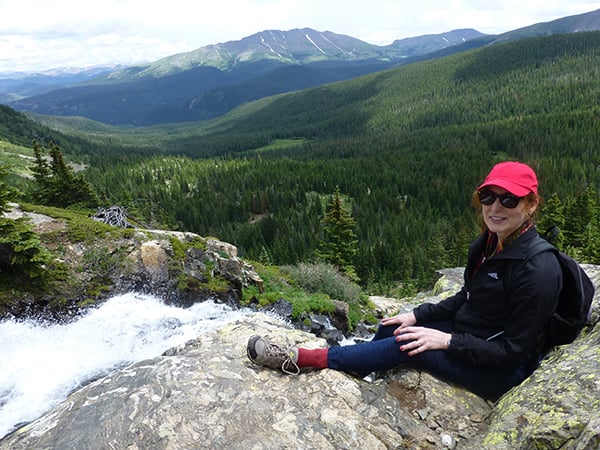I was recently hiking with my husband in Colorado in an aspen forest near Vail. It’s been hot in Dallas in August. I was counting my blessings to have a few days in a cooler climate. I had worn a hat, a Columbia brand “adventure hat” I bought at a sporting goods store. I had slathered sunscreen all over face, neck and arms. I had sprayed bug spray on my ankles, neck, wrists, and even the brim of my hat. I had brought a bottle of water and a zone bar. I had taken every precaution to guard against sunburn, bug bites, dehydration and hunger. There was one danger I had apparently forgotten though. It came to my attention about 2 miles into the hike when I came upon a sign that said “Warning: Black Bears in the area.” I stopped and looked at the sign, thinking that it would have been good to know that at the beginning of the hike. Or maybe not. In some cases in life it may be a good thing that we don’t know exactly what we’re getting into, because we might never take the risk. I’ll leave it to you the reader to come up with your own examples.
As I stood there looking at the black bear warning sign, I pictured me being confronted by a black bear. I wondered- what would I do? I would smile at the bear, gesture for it to hold off on making its next move for just a moment, pull out my iPhone and look up “What to do when confronted by a black bear.” Maybe it would have been better to look that up before I started the hike.
If I had I would have found out some invaluable information about black bears and tips on what to do when you meet one. I did just that as soon as I got back to my room.
I found out that that “black bears populates forests in North America, and frequently climb trees. I thought, “Isn’t that cute! I used to like to climb trees too when I was a kid.” I read on.
“They generally fear you more than you fear them and will do anything to avoid humans. But sows, during the breeding season and while raising their cubs, can be dangerous since their behavior will be erratic and dangerous if they detect a danger to their babies. Otherwise, black bears are generally wary, timid and retiring, and try to avoid or escape human beings. They are predominantly herbivores.”
This was good to know, but what if the bear in question hadn’t read the website and didn’t realize that it was supposed to fear me more than I feared it. What if it didn’t realize that it was by nature wary and timid? What does “predominantly” mean in the context of my hypothetical encounter with a black bear?
As I continued reading the website I learned that “Bear confrontations can occur in any setting, from town to isolated country. Although nothing will guarantee your safety in bear country (their one predictability is their unpredictability), knowledge of bears and proper behavior will reduce your risk.
“Their one predictability is their unpredictability??” I don’t like the sound of that.
Still, I read on… “In all instances,” said the website, “if you see a bear, leave. Walk backwards at an angle. Do not disturb it. Always leave the bear an escape route. Don’t panic or look the bear in the eyes. He perceives your eye contact as a threat. The bear will stand on its back legs, sniffing the air to analyze his situation. (He has bad eyesight but a keen “sniffer.”) He may “eye” you intently. Once he identifies you as a human, he will leave.
This seems like a lot of details to keep in mind. What if I forget and look the bear directly in the eyes, while walking toward it in a threatening manner?
“Pepper spray made from the juice of red hot peppers is a bear deterrent, incapacitating him and teaching him a lesson. Use it at six to eight yards.”
Yes and what kind of lesson would that be? Don’t mess with homiletics professors? Besides, I thought I was supposed to be walking backwards at an angle without making eye contact. How does the pepper spray manoever come in?
“Do not feed bears. Feeding them makes them “food-conditioned:” A fed bear is a dead bear, according to John Hechtel, a biologist in Alaska who studies bears. He notes that 95% of food-conditioned bears eventually become nuisances and must be killed.”
That’s not a problem. I only had one zone bar and I already ate it.
—Do not throw rocks or other items at bears to get their attention, even if you are after that unique bear photograph.
This piece of advice is unnecessary. “Getting that unique bear photograph” is not on my bucket list.
—If the bear is charges you, DO NOT RUN! Unless a tree is beside you, do not climb a tree, and then don’t do so unless you can climb 30 feet quickly. You cannot outrun or out-climb a black bear. Instead, stand tall, wave your arms and make loud noises—speak in a loud, deep voice.
What if, instead, I slump, look the bear in the eye, and say in a high squeaky voice “See that tree there? I bet I can climb it faster than you.”
-STAND YOUR GROUND! Often charging bears veer off within a few feet of their target, veering off in a different direction.
“Often?” “Often” isn’t the same as “always.” “Often” leaves room for exceptions,
for bears that are not acquainted with popular wisdom on how they ought to behave.
—If the bear attacks you, play dead*. Assume the fetal position. If he perceives you as food, continuing to attack, fight back, get angry. Throw your arms up in the air, yell and scream in a deep voice, throw something at it, all showing you are in control. *There is controversial evidence on “playing dead.” Some references say never do this, others say do it and only fight back if the bear attack continues.
If a bear is attacking me, how am I in any way, “in control?” If there is controversial evidence on playing dead, how can the debate be resolved? I say we hold a scholarly colloquium and present some papers on the subject by people speaking on behalf of the bears.
If I’d read the website first, I might have skipped the hike. Which would have been too bad, because the aspen forest was beautiful.
The final piece of advice on the “What to do when confronted by a black bear” website is this —“Never come between a sow and her cubs.” I include that final piece of advice for those of you who would just naturally do that if you met a black bear in the woods.











